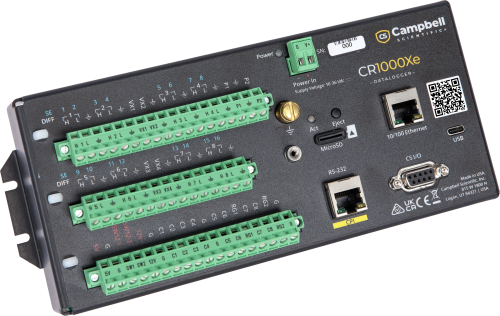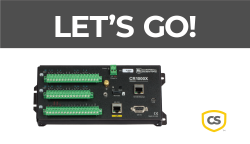Overview
The CR1000Xe provides measurement and control for a wide variety of applications. Its reliability and ruggedness make it an excellent choice for remote environmental applications including stations for hydrology and meteorology (HydroMet), solar resource assessment and monitoring (SRA/SRM), dams and mines (geotech), and broad research objectives for environmental systems.
The CR1000Xe is a low-powered device that measures analog and digital sensors, processes and stores measurements, and adapts to any communications link. It stores data and programs in non-volatile flash memory. The onboard programming language—common to all Campbell Scientific data loggers—allows users to create solutions perfectly tailored to the application.
Learn more about our CampbellAero™ Automated Weather Observing System (AWOS) Solution.
This featured product was part of the Aconcagua expedition to install a weather station on South America’s tallest peak. Learn more about the expedition on our Extreme Application Series: Aconcagua page.
Read MoreBenefits and Features
- Operates in extreme environments with a standard operating range of -40° to +70°C and an extended operating range of -55° to +85°C (0–100% RH, non-condensing environment)
- Connects directly to a computer's USB port
- Captures quickly changing data values with fast analog measurement capabilities (300+ Hz)
- Differentiates even slight changes in data values with higher-resolution measurements (24 bit Adc)
- Includes two non-isolated current input channels for directly connecting sensors with 0-to-20 mA or 4-to-20 mA current outputs
- Contains an onboard CPI port for hosting Campbell Scientific high-speed sensors and distributed modules (such as the GRANITE™ Series)
- Directly connects to Ethernet
- Includes microSD card drive for extended memory requirements
- Provides simple serial sensor integration and measurement with SDI-12, RS-232, RS-422, and/or RS-485
- Supports full PakBus networking
- Includes embedded web page for direct connection via web browser
- Offers a broad input voltage range of 10 to 36 Vdc
- Provides regulated 12 Vdc power output
- Controls CS I/O power to external modems
Images






CAD Files:
Detailed Description
The CR1000Xe electronics are shielded from radio frequency by a unique, sealed, stainless-steel canister. It includes a low-drift, battery-backed clock that can be updated by NTP, GPS, and Campbell Scientific's PakBus®. The canister and wiring panel seal together through stainless-steel connectors. The CPI and Ethernet pins are gold coated to resist corrosion. The CR1000Xe is compatible with 12 V- and 24 V-nominal systems. The data logger's wiring panel regulates 12 V outputs and includes two switchable 12 V outputs on removable terminal blocks and a switchable 12 V output on CS I/O.
Compatibility
Note: The following shows notable compatibility information. It is not a comprehensive list of all compatible or incompatible products.
Sensors
| Product | Compatible | Note |
|---|---|---|
| FW05 | The CR1000Xe is compatible when used with the CDM-A108 or CDM-A116. | |
| FW1 | The CR1000Xe is compatible when used with the CDM-A108 or CDM-A116. | |
| FW3 | The CR1000Xe is compatible when used with the CDM-A108 or CDM-A116. |
Communication Devices
| Product | Compatible | Note |
|---|---|---|
| CD295 | Contact Campbell Scientific for assistance. |
Software
| Product | Compatible | Note |
|---|---|---|
| DevConfig | ||
| KonectGDS | ||
| LoggerLink | ||
| LoggerNet | ||
| PC400 | ||
| RTDAQ | ||
| RTMCPRO | ||
| Short Cut |
Additional Compatibility Information
Sensors
With several terminal types, the CR1000Xe is compatible with nearly every available sensor, including analog (both voltage and current), serial, thermocouples, SDI-12, pulse, and frequency sensors.
Measurement and Control Peripherals
The CR1000Xe is compatible with all our multiplexers, vibrating wire interfaces, terminal input modules, and relays.
Communications
The CR1000Xe communicates via USB; 10/100 Ethernet; and multiple serial interfaces that support cellular, Wi-Fi, satellite (such as GOES, Meteosat, Iridium, and Inmarsat), and many other wired and wireless communications links.
Data can be viewed locally using Campbell Scientific software for Windows, iOS, and Android. Additionally, multiple keyboard display options are available with the CR1000KD, CD100, and CD295.
Enclosures
The CR1000Xe and its power supply can be housed in any of our standard enclosures.
Power
Any 12- or 24-Vdc source can power the CR1000Xe datalogger. Campbell Scientific power supplies commonly used with the CR1000Xe are the PS150 and PS200.
Software
Campbell Scientific software is available to program, configure, and communicate with the CR1000Xe datalogger. Various software options are available including PC400, LoggerNet, CampbellCloud™, and CampbellGo™. Consult with our sales engineers to determine the best software or cloud option.
Specifications
| Operating Temperature Range |
|
| Storage Temperature Range | -60° to +85°C |
| Operating Humidity | 0–100% RH, non-condensing environment |
| Maximum Scan Rate | 1000 Hz |
| Case Material | Anodized aluminum |
| Analog Inputs | 16 single-ended or 8 differential (individually configured). Two analog inputs can measure 4 to 20 mA or 0 to 20 mA natively. |
| Pulse Counters | 10 (P1 to P2 and C1 to C8) |
| Voltage Excitation Terminals | 4 (VX1 to VX4) |
| Maximum Source/Sink Current |
|
| Communications Ports |
|
| Data Storage Slots | microSD |
| Switched 12 Volt | 2 terminals, plus CS I/O pin 8 |
| Digital I/O | 8 terminals (C1 to C8) configurable for digital input and output. Includes status high/low, pulse width modulation, external interrupt, edge timing, switch closure pulse counting, high-frequency pulse counting, plus UART, RS-232, RS-485, SDM, SDI-12, I2C, and SPI serial-communications functions. Terminals are configurable in pairs for 5 V or 3.3 V logic for some functions. |
| Input Limits | ±5 V |
| Analog Voltage Accuracy |
|
| ADC | 24-bit |
| Power Requirements | 10 to 36 Vdc input |
| Real-Time Clock Accuracy | ±3 min. per year (optional GPS correction to ±10 µs) |
| Internet Protocols | Ethernet, PPP, RNDIS, ICMP/Ping, Auto-IP (APIPA), IPv4, IPv6, UDP, TCP, TLS (v1.2), DNS, DHCP, SLAAC, Telnet, HTTP(S), SFTP, FTP(S), POP3/TLS, NTP, SMTP/TLS, SNMPv3, CS I/O IP, MQTT(S) |
| Communications Protocols | CPI, PakBus, SDM, SDI-12, Modbus, TCP, DNP3 outstation, UDP, NTCIP, NMEA 0183, I2C, SPI, CampbellCloud HTTPS/MQTTS, and others |
| Battery-Backed SRAM for CPU Usage and Final Storage | 4 MB |
| Data Storage | 4 MB SRAM + 72 MB flash (storage expansion of up to 16 GB with removable microSD flash memory card) |
| Idle Current Drain, Average | < 2.0 mA (@ 12 Vdc) |
| Active Current Drain, Average |
|
| Dimensions |
23.8 x 10.1 x 6.2 cm (9.4 x 4.0 x 2.4 in.) Additional clearance required for cables and wires |
| Weight | 0.86 kg (1.9 lb) |
Documents
Brochures
Manuals
Technical Papers
Videos & Tutorials
Downloads
CR1000X(e) OS v.8.4.0 (6.91 MB) 09-16-2025
This download is for the CR1000X and CR1000Xe dataloggers. Execution of this download places the Operating System file(.obj) on your computer. It also updates the CRBasic Editor compiler and support files.
Why Update? New features and bug fixes. With this OS update it is recommended that you also update the Device Configuration Utility to the most recent version so that new datalogger features are available in the utility.
Note/Warning: Campbell Scientific always recommends updating operating systems on site if possible. When remote updates are required, it is recommended that you implement the necessary precautions to handle unexpected OS upload complications. All datalogger settings should be retained when updated remotely. If you choose to roll back to a previous operating system, the datalogger settings will be reset to default.
Watch the Video Tutorial: Sending an OS to a Local Datalogger.
CR1000X Web Browser Interface v.1.2 (970 KB) 09-13-2024
Standard Datalogger Web Browser Interface
Use this download to update the data logger's web browser interface.
To install this file, send it to the data logger using file control found in the Device Configuration Utility or file control found in LoggerNet.
This interface is recommended for fast IP interfaces like Ethernet and Wi-Fi. It does NOT perform well over slow communications mediums like cellular.
Note: This is NOT for system data loggers that have custom interfaces like the SunSentry, Hydro-Link, Alert205, and MeteoPV.
Frequently Asked Questions
Number of FAQs related to CR1000Xe: 4
Expand AllCollapse All
-
When the CR1000Xe is used with your existing system, it will operate the same and look the same as a CR1000X. Your existing CR1000X programs will run the same with a CR1000Xe.
-
Yes. Sign into CampbellCloud through your web browser or CampbellGo™ app, and follow the instructions to add an asset using the data logger’s UID.
-
When the CR1000Xe is used with a new system, you may be able to lower your system costs.
For example, if the CR1000Xe is placed in a system that uses 24 Vdc, a CR1000X would have required an additional 12 Vdc power supply. The CR1000Xe eliminates the cost of this additional power supply.
Similarly, if you needed a 12-V power supply to run a modem or sensor, the CR1000Xe can now be your 12-Vdc power supply.
-
The following are some differences to be aware of:
Feature CR1000Xe CR1000X USB USB-C Micro-USB Power in 10 to 36 Vdc 10 to 18 Vdc 12 V Out Current 2 A 3 A SW12 V Out Current 2 A 0.9 A CS I/O 12 V Pin Switched under user or program control Always on RS-232 and RS-485 Communications C1 to C8 C5 to C8 Ethernet Port Protection Enhanced Standard
Case Studies
Overview Iraq’s Ministry of Agriculture has deployed a nationwide network of solar-powered, satellite-linked agrometeorological stations. The......read more
Overview In a landmark milestone for global meteorological cooperation, Rwanda has become the first country to......read more
Privacy Policy Update
We've updated our privacy policy. Learn More
Cookie Consent
Update your cookie preferences. Update Cookie Preferences



























